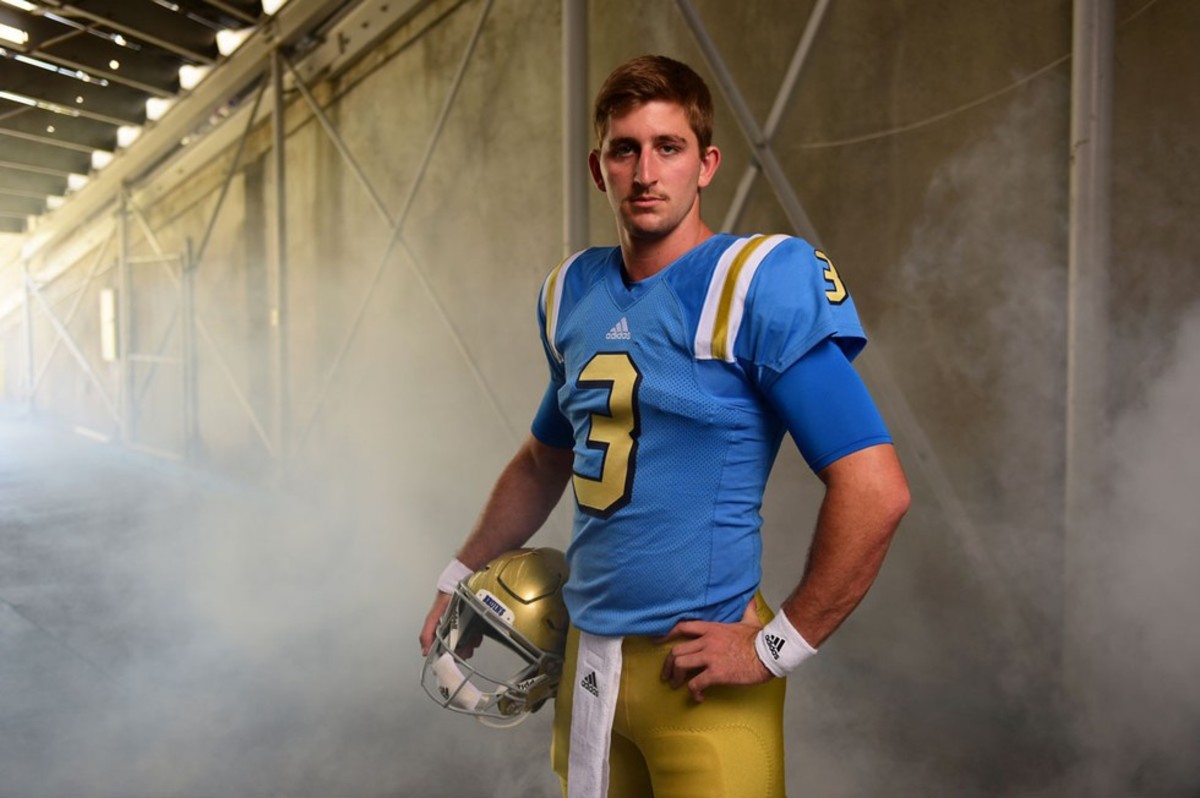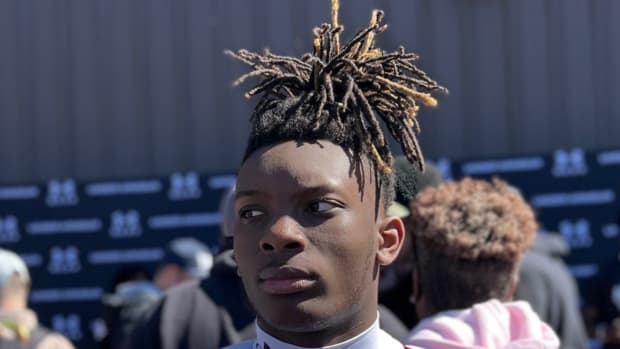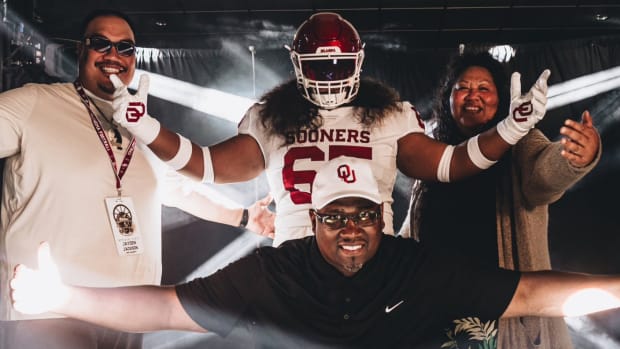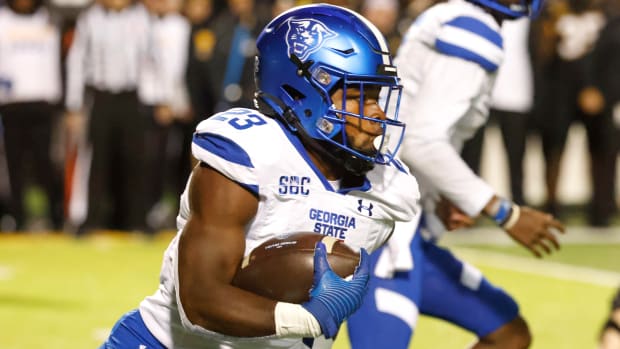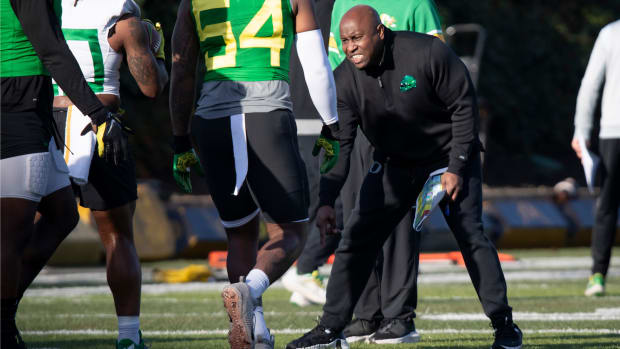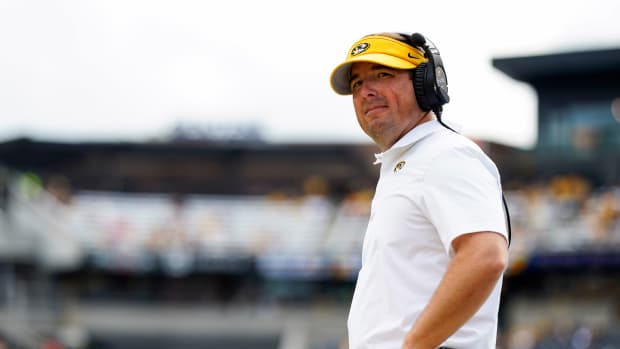Look Who's Talking: Shielded from media in 2015, UCLA QB Josh Rosen made waves on social media and is ready for close-up
[video: 13724850]
This story appears in the Aug. 15, 2016 issue of Sports Illustrated. Read the rest of the college football preview and subscribe to the magazine here.
Josh Rosen arrives early to room 170 in Dodd Hall and plops down in the back row. He's seated behind two young women, one sipping green juice and the other reading the label on a Vitamin Water Zero. Rosen is UCLA's sophomore starting quarterback and the early favorite to be the No. 1 pick in the 2018 NFL draft, which means he may one day be studied in the class that's about to begin: Communications Studies 157, an investigation of fame and celebrity in the age of social media.
During the next 125 minutes lecturer Steve Peterson holds forth on everything from the Kardashians to Billy Ray Cyrus's mullet. Like many summer classes at UCLA, this one has a high concentration of foreign students, and most don't recognize Rosen. "We've got like nine kids from Lebanon," Rosen says. "It's pretty tight."
Rosen—his own sandy blond hair a picture of sculpted randomness—is wearing a black T-shirt on which Mickey Mouse melts like the Wicked Witch of the West. He pulls out his homework assignment from a UCLA-issued backpack with ROSEN FOOTBALL embroidered on it. The paper, "Transitioning From Childhood Stardom to Adulthood," includes research on Taylor Swift and Moises Arias, though the 19-year-old Rosen could have been the subject.
When he came to Westwood in January 2015, he was among the most heralded recruits in school history, ranking 12th on Scout.com. Rosen won the starting job in camp, then completed 60.0% of his passes for 3,670 yards and 23 touchdowns and was named the Pac‑12's offensive freshman of the year. After an 8–5 finish the Bruins are the consensus pick to win the Pac-12 South this year, and they have changed from the spread to a more pro-style offense to better suit their 6' 4", 220-pound triggerman. One NFL scout says that Rosen is already the top quarterback prospect in the FBS; after the April draft, UCLA coach Jim Mora Jr. said that if Rosen had been eligible he would have been picked ahead of Cal QB Jared Goff, who went No. 1. "I'm not comparing him to Peyton Manning in the NFL," says Mora, who as an assistant with the Saints got to know Manning when he was a high school senior in New Orleans. "But at this stage of his career—essentially the same point—he's the same guy in terms of football intelligence and work ethic."
And yet Rosen has also showed signs of immaturity—two years ago he and some friends rearranged a neighbor's lawn ornaments in sexually suggestive positions—and just plain poor judgment. Since arriving at UCLA he has set off a social media firestorm over presidential politics, deleted at least one provocative Instagram post and been forced to apologize to the school. The coach is constantly asking Rosen whom he wants to be: Peyton Manning or Johnny Manziel?
"I'm not going to f‑‑‑‑‑‑ get in trouble for drugs or anything like that, but I don't want to be this crystal-clean guy with perfect responses," says Rosen. "I'm not going to pretend to be 50. I just want to be happy and enjoy the experiences I have and take advantage of every opportunity I've been given."
Josh Rosen throws darts in the living room of his off-campus apartment, which is lit exclusively by white Christmas lights. He moved into the second-floor shanty this summer, joining teammates and SAE fraternity brothers Dylan Luther and Adam Searl. Rosen could have his choice of housing, but he's picked this place with these guys—both walk-ons—in an effort to have a more typical college experience. The pad is an ode to Rosen's moment before his moment, a quintessential collegiate cocoon in which he'll complete his transition to what's next—slowly.
The only house rule is posted on the wall: miss dartboard—must take a shot or shotgun a beer. A yellow SAE flag hangs on another wall, next to a 65-inch, 4K flat screen and above the instruments for Rock Band. Rosen's decorative touch is the silver disco ball hanging in the corner. "Can you dry‑clean a couch?" Rosen asks between throws. "Like, it's pretty disgusting."
A shelf spans the width of the room, displaying 68 empty beer bottles, all different brands, from Stella to Rebel IPA to Pabst Blue Ribbon. Rosen says that because he moved in just a few weeks ago, he hasn't added any empties to the shrine. Luther assures him that many taste buds had been sacrificed: "There were some really, really gross ones."
Rosen considers playing Rock Band to put off a "binge studying" session, then extends his procrastination by pondering whether a dartboard can get too many holes in it and what Andrew Luck's Stanford dorm room looked like. Looking around, he asks hopefully, "Is this the frattiest room you've ever been in?"
There's much more to Rosen than playing ball and being a bro. He's on track to graduate with a degree in economics in three years and holds a 3.2 GPA. The books in his bedroom range from Wolf of Wall Street to Unbroken to Breakfast of Champions. "I hate reading," he says. "But I'm trying to force myself because studies have shown that it's literally the only way to matter-of-factly boost your IQ." He envies Luck for having the "raw IQ" to graduate from Stanford with a degree in architectural engineering. He looks up to actor Leonardo DiCaprio for his environmental stances and to Tesla CEO Elon Musk "because he doesn't really care about money."
Rosen is nothing if not sure of himself, which he says is why he has clashed with adults and coaches over the years. He also admits he's not the most beloved guy on the UCLA sorority scene. "I have a superiority complex I need to get rid of," he says. "Girls that I am really good homies with tell me about how often they have to defend my image to girls that don't know me." Earlier in the day he described what he's looking for in a future partner: "My wife is going to be a fighter. I need someone to tell me to f‑‑‑ off every once in a while." While noting that the demands of football don't leave him enough time for a girlfriend, he acknowledged, "I'm not mature enough right now."
Atop Rosen's dresser sits a box of watches, ranging from a family Rolex that's more than 50 years old to a $25 timepiece that he wears on game days. The face of the watch doubles as essentially a galactic address, showing Earth as it sits in the wider view of the universe. "It reminds me to keep everything in perspective," he says. "Even if the whole world goes to s‑‑‑, understand that you are a tiny, tiny, tiny, tiny, little instance in a much larger universe and that you should just take things for what they are and move on."
Stephen Dunn/Getty Images
Josh Rosen grew up in a four-bedroom house in Manhattan Beach, Calif., that's now valued at nearly $8 million. The walls and bookshelves of the home are adorned with reminders of his family's vast success—his father's regional championship ice skating medals, his mother's journalism awards. One family friend calls the Rosens "American royalty."
Josh's father, Charles Rosen, is a spine surgeon who was on President Obama's short list for surgeon general. Josh's mother, Liz Lippincott, is a former editor at Sportstyle and Golfpro magazines, and both are accomplished ice dancers. (They divorced in 2012.) Lippincott, a Princeton graduate, is the great-great-granddaughter of Joseph Wharton, who founded the Wharton School at the University of Pennsylvania. She's also the great-great-granddaughter of Joshua Ballinger Lippincott, who founded the J.B. Lippincott publishing company in 1836. Josh, the middle of three kids, is named after him. "I come from a wealthy, affluent, educated family," Rosen says. "I mean, not like get-a-Lambo-for-my-16th-birthday- wealthy, but like, affluent."
USC tennis coach Peter Smith, a friend of the family, describes Rosen as the "classic kid from your overachieving family." Other than his genes, the thing that most set Rosen up for football stardom was a tennis career that peaked and fizzled before he became a teenager. Rosen was at times the No. 1–ranked 10-and-under player in Southern California, and he earned a national ranking at 12. "He could have been as good as he wanted to be," says Smith.
Rosen appeared on his way to at least a professional career, if not his dream of playing Roger Federer on Centre Court at Wimbledon. But the sport began to consume him: He'd feel invincible after tournament wins and inconsolable after each loss. "I was wondering why he was doing it," Charles says. "He just didn't enjoy it."
A right shoulder injury sidelined Rosen for a few months when he was 12, and it changed his perspective and the course of his sporting life. During his time away he discovered friends, girls and the camaraderie of team sports. He asked himself, Do I really want to go back to this sport that has been making me so miserable?
Rosen's tennis career did have an enduring impact. The 3.5 seconds a quarterback typically gets to throw feels like an eternity compared to reaction times in tennis. On the court he learned to trust his eyes and not overthink things. In football he exhibits a nonchalance after interceptions or negative plays—which has drawn criticism because some have taken it for indifference—but in tennis he knew he could lose dozens of points yet still win the match. Mistakes are part of the game. "I learned how I competitively function," he says. "Tennis meant too much for me. It ruined it. So when I play football, I've learned to sort of take things lightly and keep moving. I wouldn't want to lose the sport of football like I lost tennis."
Josh Rosen exits the Bruins' athletic facilities wearing a royal-blue T-shirt, gray workout pants—both LuluLemon—and Rainbow flip‑flops. He opens up the seat of his powder-blue Genuine Scooter and straps on an American-flag-patterned helmet. "Of course they do!" he says when asked if his teammates make fun of him. "But I also have a mustache."
Rosen doesn't drive the scooter for attention but because it makes numeric sense and because he loves the logic and certainty of numbers. It costs $237 per quarter to park a car at the facility; it's free to park the scooter. (Plus he can put it in the best spots.)
But that brand of pragmatism has not yet influenced all of his decision-making. Rosen wore a white "F‑‑‑ Trump" bandana around a blue baseball hat while playing at Trump National Golf Club in Rancho Palos Verdes, Calif., in April, a round he bought as an ironic birthday present for a friend who supported Bernie Sanders. "Every single employee on the entire course complimented me," Rosen says. He posted a picture on Instagram, where he has 21,400 followers, and it went viral. A faux controversy bloomed. Rolling Stone blogged about him. His teammates overwhelmingly supported him. Mora brought up the Manziel comparison. "I don't regret posting the photo at all," Rosen says, "because personally I thought it was hilarious."
He does regret that the profanity overshadowed his stance. "I want people to know I'm a real person, that I don't have someone running my Instagram, I don't have someone prewriting all of my interviews and stuff," Rosen says. "With Trump, I'm learning to evolve my message and understand how to convey the substance of it."
Nor did the fallout prevent him from speaking out again in May, when he posted a Los Angeles Times graphic on Instagram showing that UCLA's $280 million deal with Under Armour is the largest in NCAA history. Rosen captioned the post with, "We're still amateurs, though . . . . Gotta love non-profits. #NCAA." Rosen deleted that post and got an earful from Mora, who was disappointed that the quarterback's statement distracted from an important day for the university. "I said you can't do that," Mora recalls. "He says, 'So many of my teammates have nothing. I have a platform where I can advocate.' I said, 'I understand that, Josh, and respect it. But there's a bigger picture you have to understand.' "
Perhaps Rosen will learn some of that in Comm 157; social media has not always been kind to him. Last fall, inspired by a friend at Arizona State, he went online and paid $400 for an inflatable Lay‑Z‑Spa hot tub. ("It came down to my roommate and I saying, 'What are we going to be able to tell our kids we did in college?'") He installed it in his dorm room, using a 20-foot beer funnel for a hose. His mom even came over to see it. But a picture posted on Instagram by one of Rosen's friends ended up going viral, drawing coverage from TMZ. The school forced Rosen to remove the tub. He had to write an apology paper to the school, which he struggled to take seriously.
"I'm not a social media guy, I'm not," Rosen says. "It's just once every three weeks it's like, Hey, let's shake some s‑‑‑ up," Rosen says. "I like to be a real person and show personality. People appreciate that."
Juan Lainez/CSM
Josh Rosen dropped back on a third-and-16 in the fourth quarter of UCLA's 56–35 loss at Stanford last season and zipped a ball nearly 40 yards through two defenders to receiver Thomas Duarte. The touchdown pass showcased everything the NFL will value about Rosen—his lightning release, feathery touch and advanced ability to read defenses.
When Rosen jogged off the field after the play, Mora recalls him saying, "I figured, what the hell, I might as well throw it." Mora implored Rosen to do so more often: "Josh, you've got to make that throw at every point in the game, because that's a throw you're capable of making and others aren't. And that's an NFL throw." No one knows this better than Mora, who has coached both the Falcons (2004 to '06) and the Seahawks ('09). "Give me a little credit, I know what I have here," Mora says with a laugh. "Josh has a more pure throwing motion than just about any quarterback you'll ever see. It's a beautiful thing."
Rosen's football path is more remarkable for what he didn't do rather than what he did. He didn't hire a high-profile quarterback coach. ("I think it's all b.s.," he says. "I think they are just great marketers.") He also didn't go to one of Southern California's proven football strongholds, such as Mater Dei, Oaks Christian or Santa Margarita. And he didn't choose one of the usual Top 10 suspects despite getting scholarship offers from almost all of them. "I'm not a fan of, like, powerhouses," he says. "I like messing up the system. I'm all about equality and kind of bringing some phoenixes from the fire."
Rosen attended St. John Bosco High, a Catholic school in blue-collar Bellflower that appeared a strange fit for a Jewish kid from tony Manhattan Beach. His transition wasn't seamless. Early in his career Rosen overthought, delivering 40-second explanations to offensive coordinator Chad Johnson about a play that lasted six. Rosen developed a habit of throwing across his body, which often led to interceptions, and he made so many pre-snap adjustments that he'd get -delay-of-game penalties. Bosco coach Jason Negro found himself saying, "Everybody understands that you're an intelligent guy, Josh. You don't have to wear it on your sleeve."
The phoenix rose his junior season. Rosen led Bosco to a 16–0 record, its first CIF Southern Section championship and its first state title, in 2013, throwing for 3,200 yards and 39 touchdowns. That included three straight playoff games in which a running clock was evoked as a mercy rule. Bosco went 12–2 in Rosen's senior year, and along the way he endeared himself to the coaches and faculty by napping on the floor of the football offices, raising money through local businesses to help kids on his team pay for road trips and earning a weighted 4.8 GPA.
Four years earlier, on his visit to Bosco, Rosen had asked the coaches and academic officials if coming out of their school he'd be able to get into Stanford. Growing up the son of Penn and Princeton graduates, Rosen saw Stanford as a football Ivy. He attended a camp in Palo Alto the summer before his junior year but returned without a scholarship offer, heartbroken. Rosen recalls that he didn't click with the mild-mannered Cardinal coach David Shaw, who appeared put off by questions about the depth chart. Shaw says the Cardinal coaches simply decided to not take a quarterback in that class because of roster numbers.
Rosen returned to Bosco devastated but now calls the snub "probably the best thing that ever happened to me," he says. "I'm not Stanford, and I would have hated it. It was good for me because it killed my ego a little bit."
Still, Rosen's ego remained an issue. During the summer-camp circuit of 2014, Elite 11 coach Trent Dilfer butted heads with Rosen after the prodigy took liberties with the playbook. Dilfer made public comments that Rosen needed to "buy into what I'm preaching." (He now predicts that Rosen's adjustment to UCLA's new offense will be telling. "Everyone is depending on him buying into something bigger than himself," Dilfer says. "If he decides to do it, he'll win the Heisman and the Pac‑12 and be the first pick in the draft. He's that talented."
Despite the negative talk, Rosen remained in demand, and he surprised many by choosing the Bruins. "Even as a USC fan growing up, I liked UCLA a lot because I saw potential in the program," Rosen says, "and I really wanted to just mess with everyone."
Robert Beck/SI
Josh Rosen exits Dodd Hall, and he strolls past the eucalyptus trees on the sun-splashed main quad. He stops in front of stately Royce Hall and points out the brick building's 52 asymmetries. They were included because the builders felt "only God can make something perfect."
Rosen is thrilled that his college imperfections are playing out at UCLA; he has a genuine affinity for the school and program. But he admits he picked it for all the wrong reasons. Besides the chance to "mess" with people, he liked the opportunity to start early, the free gear—hats and shirts, etc.—and the L.A. social scene. He now appreciates the networking opportunities and the ability to retain some semblance of anonymity in a town full of A-listers. "In retrospect, being Jewish is a big reason why I should have considered UCLA," he says. "Just because of how Jewish Hollywood is, and they really want someone to look up to because they just don't have professional athletes."
Rosen also has a unique relationship with his coach. The Moras live two blocks from the Rosens, close enough that Mora walked to the in-home visit. The families have become close because of Rosen's friendship with Mora's daughter, Lillia, a USC junior.
On Christmas Eve two years ago Rosen fell asleep on Mora's couch. Last Christmas the Moras hosted the Rosens. The day after UCLA lost to rival USC 40–21 to close the regular season, Rosen showed up at Mora's house. They watched an NFL game together, mostly in silence. Mora took that as a sweet gesture, a player stopping by to pick up his coach. "He's a challenge," Mora says of Rosen. "But he's a fun challenge, a great challenge and an interesting challenge."
Rosen's own set of challenges? He wants to lead UCLA to a conference title and eventually become a Super Bowl–winning, All-Pro quarterback who can make enough money off the field to play for the league minimum so his team can spend its salary cap space on his teammates. After football, he wants to work in venture capital and model his post-football life after the business success of former Bruins quarterback Troy Aikman, who has owned multiple businesses and dabbles in real estate.
For now, though, Rosen just wants to be a college student. So with class finished, he heads back to his fratty apartment. There, he'll balance studying for his Comm 157 midterm with providing a case study for the course's future students.
